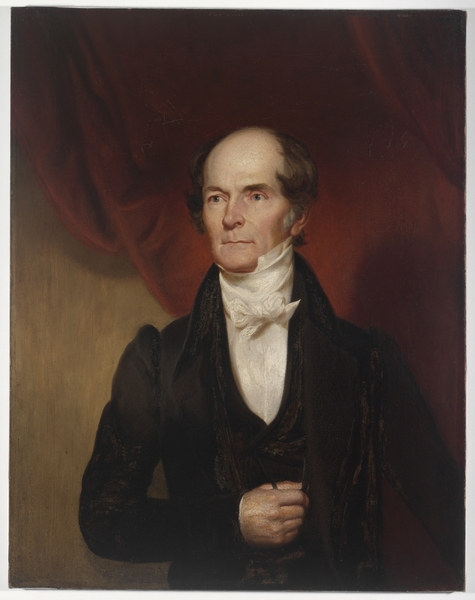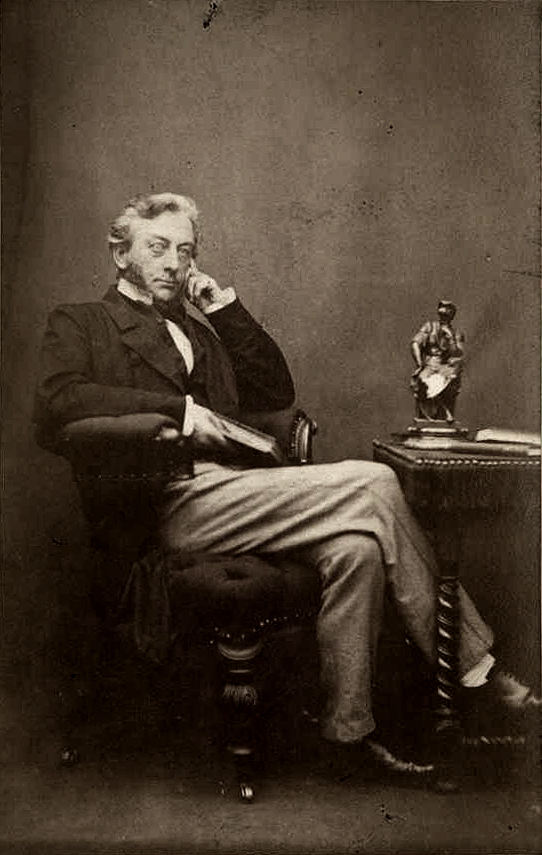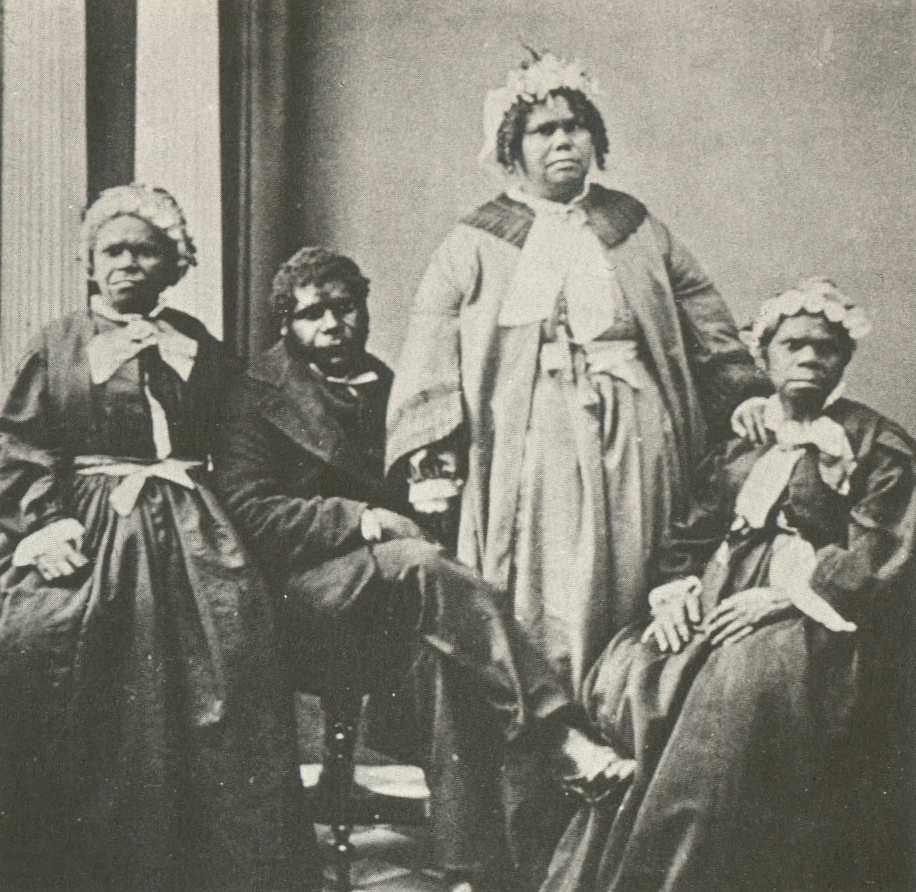|
Alfred Stephen
Sir Alfred Stephen (20 August 180215 October 1894) was an Australian judge and Chief Justice of New South Wales. Early life Alfred was born at St Christopher in the West Indies. His father, John Stephen (1771–1833), was related to James Stephen, became a barrister, and was Solicitor-General at St Christopher before his appointment as Solicitor-General of New South Wales in January 1824. John arrived at Sydney on 7 August 1824 and in September 1825 was made an acting judge of the Supreme Court. On 13 March 1826, his appointment as judge was confirmed. He resigned his position at the end of 1832 on account of ill-health and died on 21 December 1833. Alfred was educated at Charterhouse School and Honiton grammar school in Devon. He returned to St Christopher for some years and then went to London to study law. In November 1823 he was called to the bar at Lincoln's Inn, and the following year sailed for Van Diemen's Land (Tasmania). Van Diemen's Land Stephen arrived at Hoba ... [...More Info...] [...Related Items...] OR: [Wikipedia] [Google] [Baidu] |
Chief Justice Of New South Wales
The Chief Justice of New South Wales is the senior judge of the Supreme Court of New South Wales and the highest-ranking judicial officer in the Australian state of New South Wales New South Wales (commonly abbreviated as NSW) is a States and territories of Australia, state on the Eastern states of Australia, east coast of :Australia. It borders Queensland to the north, Victoria (state), Victoria to the south, and South .... The Chief Justice is both the judicial head of the Supreme Court as well as the administrative head, responsible for arranging the business of the court and establishing its rules and procedures. The current Chief Justice is Andrew Bell who was appointed by Governor Margaret Beazley. List of chief justices of New South Wales See also * Judiciary of Australia References {{Government of New South Wales Lists of judges of Australian superior courts ... [...More Info...] [...Related Items...] OR: [Wikipedia] [Google] [Baidu] |
Hobart
Hobart ( ) is the capital and most populous city of the island state of Tasmania, Australia. Located in Tasmania's south-east on the estuary of the River Derwent, it is the southernmost capital city in Australia. Despite containing nearly half of Tasmania's population, Hobart is the least-populated Australian state capital city, and second-smallest by population and area after Darwin if territories are taken into account. Material was copied from this source, which is available under Creative Commons Attribution 4.0 International License Its skyline is dominated by the kunanyi / Mount Wellington, and its harbour forms the second-deepest natural port in the world, with much of the city's waterfront consisting of reclaimed land. The metropolitan area is often referred to as Greater Hobart, to differentiate it from the City of Hobart, one of the seven local government areas that cover the city. It has a mild maritime climate. The city lies on country which was known by the l ... [...More Info...] [...Related Items...] OR: [Wikipedia] [Google] [Baidu] |
Henry Ross Lewin
Henry Ross Lewin or Henry Ross-Lewin (c. 1830 – April 1874) was one of the most prominent blackbirders of South Sea Islander labour in the 19th century. He worked with Robert Towns in the early 1860s to establish this labour trade in the British colony of Queensland. He later worked as an independent recruiter of Islander labour for himself and other capitalists. Ross-Lewin also formed a plantation on the island of Tanna where he was killed in 1874. Early life Ross-Lewin's exact background is not fully known. It appears he was born around 1830 in the United Kingdom and joined the British Navy when he was a teenager. He served in the China Squadron, but was discharged for behavioural reasons probably in the late 1840s. It appears he came to Australia around 1851, possibly in association with the Chinese coolie trade as he was a passenger on the ''Duke of Roxburgh'' bringing people from Amoy to Sydney. In 1851, he was employed as a sailor on the ''Black Squall'' which was a coast ... [...More Info...] [...Related Items...] OR: [Wikipedia] [Google] [Baidu] |
Levuka
Levuka () is a Local government in Fiji, town on the eastern coast of the Fijian island of Ovalau (Fiji), Ovalau, in Lomaiviti Province, in the Eastern Division, Fiji, Eastern Division of Fiji. Prior to 1877, it was the capital of Fiji. At the census in 2007, the last to date, Levuka town had a population of 1,131 (plus 3,266 living in the peri-urban area as defined by the Bureau of Statistics), about half of Ovalau's 8,360 inhabitants. It is the economic hub and the largest of 24 settlements on the island. Having been nominated decades prior, Levuka was designated a UNESCO World Heritage Site in June 2013, in recognition of the port town's exceptional testimony to the late colonial port towns in the Pacific. History The modern town of Levuka was founded around 1820 by European settlers and traders as the first modern town in the Fiji Islands, and became an important port and trading post. A disparate band of settlers made up Levuka's population – traders, missionaries, shipwr ... [...More Info...] [...Related Items...] OR: [Wikipedia] [Google] [Baidu] |
Blackbirding
Blackbirding was the trade in indentured labourers from the Pacific in the 19th and early 20th centuries. It is often described as a form of slavery, despite the British Slavery Abolition Act 1833 banning slavery throughout the British Empire, including Australia. The trade frequently relied on coercion, deception, and kidnapping to transport tens of thousands of indigenous people from islands in the Pacific Ocean to Australia and other European colonies, often to work on plantations in conditions similar to the Atlantic slave trade. These blackbirded people, known as Kanaka (Pacific Island worker), Kanakas or South Sea Islanders, were taken from places such as Papua New Guinea, the Solomon Islands, Vanuatu, Niue, Easter Island, the Gilbert Islands, Tuvalu and the islands of the Bismarck Archipelago, amongst others. The owners, captains, and crews of the ships involved in the acquisition of these labourers were termed ''blackbirders''. Blackbirding ships began operations in the ... [...More Info...] [...Related Items...] OR: [Wikipedia] [Google] [Baidu] |
HMS Rosario (1860)
HMS ''Rosario'' was an 11-gun screw sloop of the Royal Navy, launched in 1860 at Deptford Dockyard. She served two commissions, including eight years on the Australia Station during which she fought to reduce illegal kidnappings of South Sea Islanders for the Queensland labour market. She was decommissioned in 1875, finally being sold for breaking nine years later. A team from ''Rosario'' played the first ever New Zealand International Rugby Union match against a Wellington side in 1870. She was the fifth Royal Navy ship to bear the name, which was first used for the galleon ''Del Rosario'', captured from the Spanish in 1588. Design The ''Rosario'' class was designed in 1858 by Issac Watts, the Director of Naval Construction. They were built of wood, were rated for 11 guns and were built with a full ship rig of sails (this was reduced to a barque rig by about 1869). With a length overall of and a beam of , they had a displacement of 913 tons. These were the last slo ... [...More Info...] [...Related Items...] OR: [Wikipedia] [Google] [Baidu] |
President Of The New South Wales Legislative Council
The President of the New South Wales Legislative Council is the presiding officer of the upper house of the Parliament of New South Wales, the Legislative Council. The presiding officer of the lower house is the speaker of the Legislative Assembly. The role of President has generally been a partisan office, filled by the governing party of the time. As of May 2023, the president is Ben Franklin. Election Between 1856 and when the Legislative Council was re-constituted in 1934 the president was appointed by the Governor. From 1934 the President was chosen by the council, however there was no contested election between 1934 and 1988. Instead each of Sir John Peden, Ernest Farrar, William Dickson and Sir Harry Budd continued to hold office until they ceased to be a member of the council, regardless of the composition of the council or which party was in government. In 1991 this was changed by legislation that required the president to be chosen by ballot after each election. S ... [...More Info...] [...Related Items...] OR: [Wikipedia] [Google] [Baidu] |
Puisne Judge
Puisne judge and puisne justice () are terms for an ordinary judge or a judge of lesser rank of a particular court. The term comes from a combination of the two French words, (since, later) and (born) which have been combined as or ; meaning "junior". Use The term is used almost exclusively in common law jurisdictions: the jurisdiction of England and Wales within the United Kingdom; Australia, including its states and territories; Canada, including its provinces and territories; India, including its states and territories; Pakistan, its provinces, and Azad Kashmir; the British Overseas Territory of Gibraltar; Kenya; Sri Lanka; South Africa in rural provinces and Hong Kong. In Australia, the most senior judge after a chief justice in superior state courts is referred to as the "senior puisne judge". Use is rare outside of, usually internal, court (judicial) procedural decisions as to which will sit or has sat in hearings or appeals. The term is dated in detailed, academic c ... [...More Info...] [...Related Items...] OR: [Wikipedia] [Google] [Baidu] |
John Walpole Willis
John Walpole Willis (4 January 1793 – 10 September 1877) was a British judge of Upper Canada, British Guiana (as acting Chief Justice), the Supreme Court of New South Wales, and resident judge at Port Phillip, Melbourne. Early life The second son of Captain William Willis (of the 13th Light Dragoons) and his wife Mary Hamilton Smyth (of the family of the Viscounts Strangford), Willis was born at Holyhead, Anglesey, where his father was stationed. He was a descendant of the Willises of Suffolk and Cambridgeshire – from whom descended the Willys baronets of Fen Ditton – through his grandfather, Joseph Willis of Wakefield, Yorkshire, where the family had been settled since the seventeenth century. Willis was educated at Rugby (alongside his elder brother, William Downes Willis), Charterhouse (whence he was expelled for taking a leading part in a school rebellion alongside a fellow student, Wood), and as a fellow-commoner at Trinity Hall, Cambridge, where he took an ... [...More Info...] [...Related Items...] OR: [Wikipedia] [Google] [Baidu] |
Aboriginal Tasmanians
The Aboriginal Tasmanians (palawa kani: ''Palawa'' or ''Pakana'') are the Aboriginal people of the Australian island of Tasmania, located south of the mainland. At the time of European contact, Aboriginal Tasmanians were divided into a number of distinct ethnic groups. For much of the 20th century, the Tasmanian Aboriginal people were widely, and erroneously, thought of as extinct and intentionally exterminated by white settlers. Contemporary figures (2016) for the number of people of Tasmanian Aboriginal descent vary according to the criteria used to determine this identity, ranging from 6,000 to over 23,000. First arriving in Tasmania (then a peninsula of Australia) around 40,000 years ago, the ancestors of the Aboriginal Tasmanians were cut off from the Australian mainland by rising sea levels 6000 BC. They were entirely isolated from the outside world for 8,000 years until European contact. Before British colonisation of Tasmania in 1803, there were an estimated ... [...More Info...] [...Related Items...] OR: [Wikipedia] [Google] [Baidu] |
Black War
The Black War was a period of violent conflict between British colonists and Aboriginal Tasmanians in Tasmania from the mid-1820s to 1832 that precipitated the near-extermination of the indigenous population. The conflict was fought largely as a guerrilla war by both sides; some 600 to 900 Aboriginal people and more than 200 British colonists died. When a British penal settlement was established in Tasmania (then called Van Diemen's Land) in 1803, the Aboriginal population was 3,000 to 7,000 people. Until the 1820s, the British and Aboriginal people coexisted with only sporadic violence, often caused by settlers kidnapping Aboriginal women and children. Conflict intensified from 1824, as Aboriginal warriors resisted the rapid expansion of British settlement over their land. In 1828, the British declared martial law and in 1830 they unsuccessfully attempted to force hostile Aboriginal nations from the settled districts in a military operation called "the Black Line". In a series ... [...More Info...] [...Related Items...] OR: [Wikipedia] [Google] [Baidu] |
Attorney-General Of Tasmania
The attorney general of Tasmania, in formal contexts also attorney-general or attorney general for Tasmania and usually known simply as the attorney general, is a minister in the Government of Tasmania who has responsibility for the administration of justice in Tasmania, Australia. In addition, the attorney general is one of the Law Officers of the Crown. The attorney-general serves as the chief legal and constitutional adviser of the Crown and Government of Tasmania. The position is not directly elected, and instead is chosen by the premier and appointed by the governor. The current attorney-general of Tasmania, since 2 October 2023, is Guy Barnett of the Liberal Party. List of attorneys-general of Tasmania See also * Justice ministry * Government of Tasmania References {{Australian Attorneys-General Tasmania Tasmania (; palawa kani: ''Lutruwita'') is an island States and territories of Australia, state of Australia. It is located to the south of the Mainl ... [...More Info...] [...Related Items...] OR: [Wikipedia] [Google] [Baidu] |







